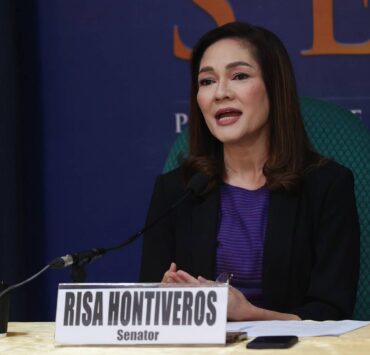DFA: ‘One China’ policy stays; Sen. Erwin Tulfo disagrees

The Philippines continues to recognize the People’s Republic of China as the only Chinese sovereign state, said the foreign affairs chief, weeks after Beijing was riled up by President Marcos’ remark on its political conflict with Taiwan.
Department of Foreign Affairs (DFA) Secretary Ma. Theresa Lazaro told a Senate committee hearing on Thursday that the Philippines remains committed to the “One China” policy, the long-standing position that there is only one government of China and that Taiwan is part of Chinese territory.
This, Lazaro noted, goes way back to the 1975 Joint Communique between the Philippines and China, where the two nations pledged to recognize and respect each other’s sovereignty and territorial integrity.
“Successive administrations have reinforced the One China policy through separate but related issuances,” Lazaro said in her keynote speech before the Senate foreign relations panel.
Taiwan relations
Still, despite not recognizing Taiwan’s independence, the Philippines has “longstanding relations with the Taiwanese people, and we therefore benefit from continued engagement with them,” stressed Lazaro.
And while only Chinese people can resolve their disputes, she added that conflict would have an “impact on geographically proximate territories.”
Lazaro pointed out that President Marcos has not deviated “from our principle of non-interference in each other’s internal affairs,” referring to China.
During his state visit to India early this month, Mr. Marcos said the Philippines would naturally be drawn to a China-Taiwan war and would therefore prioritize the humanitarian repatriation of over 150,000 overseas Filipino workers in Taiwan should such a conflict arise.
“To be very practical about it, if there is a confrontation over Taiwan between China and the United States, there is no way that the Philippines can stay out of it simply because of our physical geographic location,” Marcos told reporters on Aug. 6 when asked whether he would allow the United States to use Philippine resources to defend Taiwan from China.
Beijing responded by saying Mr. Marcos’ statement was “playing with fire,” and accused Manila of “going back on its word.”
“It has kept making wrong and provocative remarks and actions, kept fudging and hollowing out the one-China principle, and kept harming the China-Philippines relations,” the Chinese foreign ministry said.
Merely ‘stating facts’
Mr. Marcos, three days later, countered Beijing’s reaction, saying he was merely “stating facts.”
“Despite our fervent wish to avoid any confrontation with anybody, anywhere, war over Taiwan will drag the Philippines kicking and screaming into the conflict. That is what I was trying to say. That’s why I don’t understand… because of the narrative coming out about playing with fire and being provocative and all of that.”
“We do not want to go to war. But I think, if there is a war over Taiwan, we will be drawn, whether we like it or not, into that mess,” he said.
In April this year, Malacañang issued Executive Order No. 313, which bans all government officials from conducting official visits to Taiwan or any other activity in their capacity as public officers without clearance from the DFA.
The directive, it said, was in line with the country’s commitment to the One China policy.
Tulfo: Revisit policy
Sen. Erwin Tulfo, however, broached the need for the Philippine government to revisit the One China policy since China, he said, continues to harass Filipinos and claim ownership of the West Philippine Sea (WPS).
“We observe the One China policy here—but what about us? What about our rights? Our personnel, our coast guard, and navy personnel are being harassed. Our fishermen are driven away back to our shores. [In] my opinion, we really have to think of this position.” he said.
Addressing Tulfo’s concern, Lazaro explained that there are ongoing mechanisms to de-escalate tensions in the WPS.
“We have many mechanisms and they work in different sectors. We have the bilateral consultative mechanism of the South China Sea. This is at the level of the foreign ministry. It may seem that it doesn’t have that much impact, but yes it does,” she said.
But, Tulfo argued, despite such diplomacy, China’s attacks have become more intense.
“It’s like bringing a pen to a gunfight. Diplomacy without deterrence is weakness,” he stressed.
“The point is, why does our neighbor continue to bully us? Are we just allowing ourselves to be bullied in the name of diplomacy?,” he asked.

















